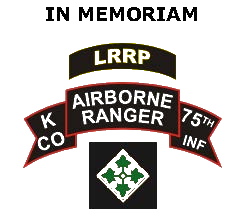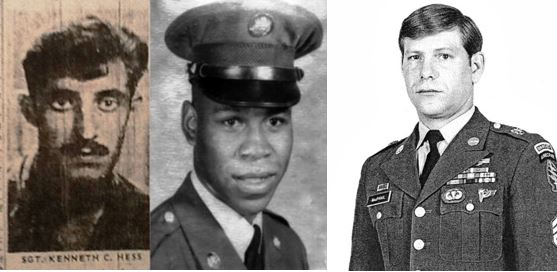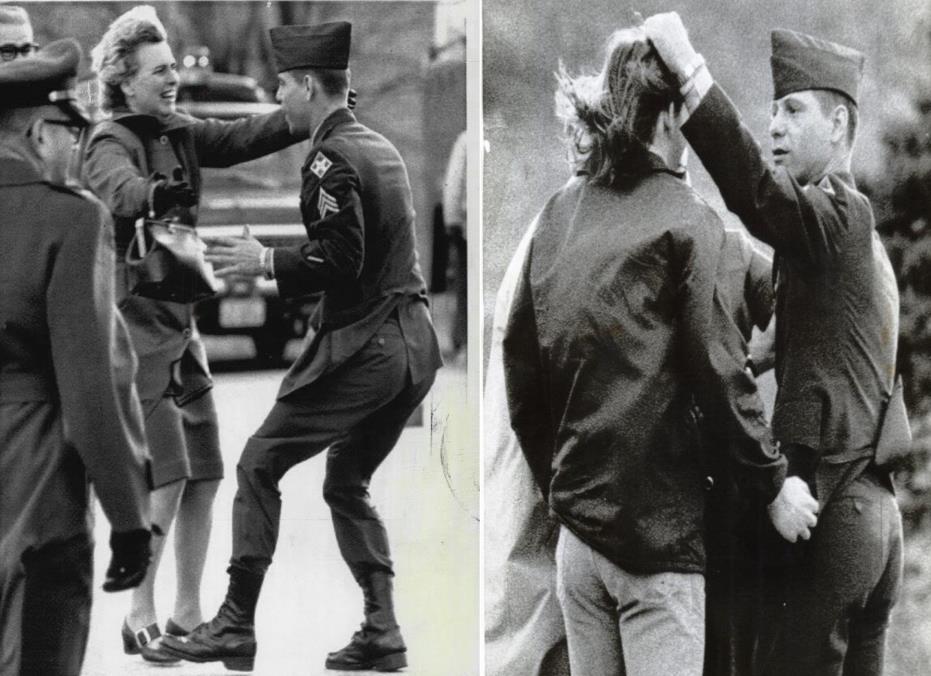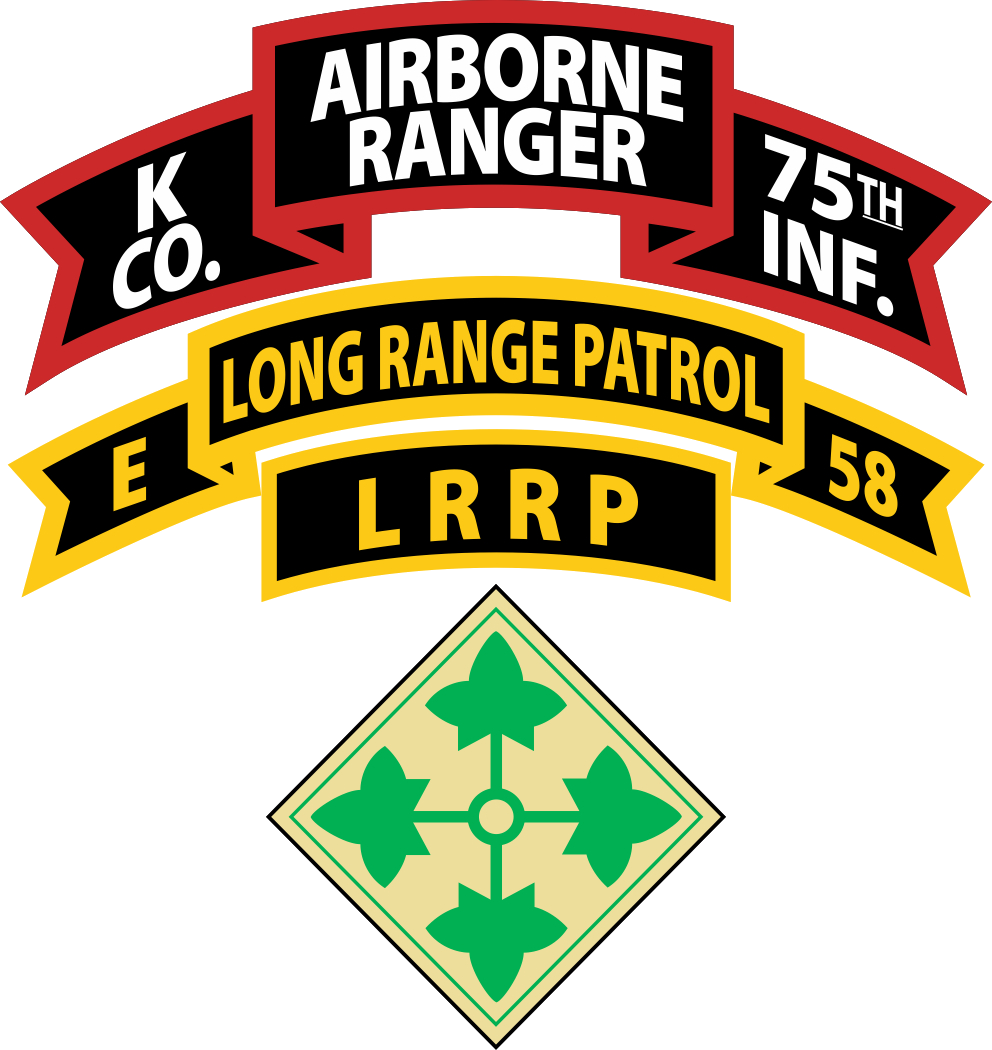
Sgt. Kenneth Hess, KIA
Pfc. Nathaniel Irving, KIA
Sgt. Don McPhail, POW
Ju Hmok, Scout, KIA

Kenneth Hess, Nathaniel Irving and Don MacPhail
3rd Brigade LRRPS, K/75 Ranger – Team C
Note: We would like to gratefully acknowledge Mark G. Maloy of “A Square Heroes Foundation (www.ashf.net) for the research and compilation of the following tribute. Mr. Maloy’s organization provides recognition, preservation and facilitating outreach to all members of our Armed Services.
On February 1, 1969, Company K (Ranger) of the 75th Army Infantry was activated. Later known as the “Highland Rangers” (covering the Vietnam Central Highlands) their mission was to provide long range reconnaissance, surveillance, harassment and target acquisition.
On the evening of that activation, Company K’s Team C were dropped by parachute inserting them to monitor enemy activity around a jungle river valley in Pleiku Province. The recon team consisted of Sgt. Kenneth Hess, Sgt. Don MacPhail, Pfc. Nathaniel Irving and a Montagnard Scout (Central Highland native familiar with the area) named Ju Hmok.
Patrol leader Sgt. Hess radioed on the second day there was nothing to report but he was feeling ill. He declined the team being extracted early. Sgt. MacPhail took over as team leader. The 4-man patrol later reported again that everything was normal and they were waiting at the pick-up zone. No further contact was received. Shortly after that, Team C was surrounded by Viet Cong and the battle began.
Team C was ringed by what appeared to Don to be 15 or 20 Viet Cong heavily armed with .50 caliber machine guns and AK-47’s. As the firing commenced, Pfc. Irving was the first killed from a massive head wound while trying to find cover.
Sgt. Hess, Don and Ju Hmok were trapped, and a 25-minute firefight followed. The three were effective using M-60 machine guns, as well as fragmentation and phosphorous grenades. However, their best escape route soon became impassable when the VC lit the dry elephant grass in that area on fire. The combat became hand to hand. Don was able to shoot a VC attacking Sgt. Hess but Don was then hit with a bullet to his leg.
When Don could focus again, Sgt. Hess was dead with his head blown off. Ju Hmok saw Don go down and Don’s memory was that Ju assumed he was dead as well. Ju broke free and was last seen by Don running to safety. Firing as best he could, Don then ran directly through the burning grass and attacking Viet Cong. He killed two VC as he broke through to the cover of a ravine and was able to make his escape from the deadly encirclement.
10 days later, on February 11, two companies of the 1st Battalion, 35th Infantry reached the firefight area where they found the bodies of Sgt. Hess and Pfc. Irving.
Infantrymen mistook Team C Scout Ju Hmok for “a wounded but armed NVA soldier” and killed him at a distance. He apparently had hidden successfully after the assault and was running towards the soldiers for rescue. (Source: “Rangers At War, LRRPs in Vietnam”)
23-year-old Sgt. Kenneth Hess was only weeks away from his tour ending. While in Vietnam, his wife had given birth to a son he would never see. Sgt. Hess’s father died in WWII before Kenneth was born.
21-year-old Pfc. Nathaniel Irving appears to have had the nickname “Dobie Jones” according to Don MacPhail’s recollection of the team and attack. Pfc. Nathaniel Irving would have a daughter born to him 6 months after he was killed.
After a difficult effort to evade the VC, Don was captured 4 days after the attack on Team C while trying to get to a Special Forces Camp. He was shot two more times in the leg and was hit with grenade shrapnel.
From the very beginning of the war, North Vietnam’s stated position was that American prisoners captured in North Vietnam were “war criminals” who had committed crimes against the North Vietnamese people in the course of an illegal war of aggression.
This meant North Vietnam denied American prisoners the privileges and rights granted to prisoners of war under the terms of the Geneva Convention.
Don received no medical treatment after capture and was taken unconscious to a POW camp in Cambodia. His next memory was being hung over a tree branch with an empty grave below him. His interrogators said it would be his if he didn’t tell them what they wanted to know. They then tortured him for 4 hours putting metal rods through his bullet wounds and whipping his back.
He carried no identification on him when he was taken prisoner. He assumed the identity of a dead friend, which had been suggested in his training if captured.
That helped confuse his captors with the misinformation he could offer. Unfortunately, it might have also caused the confusion the Army had about his actual status. For two years it was presumed he’d perished. His family thought he was dead.
This initial torture would be the beginning of much more to come during his 1,498 days in captivity. 38 months of that imprisonment held in solitary confinement, usually with his legs in shackles.
Don was moved to several POW camps during the next four years. He watched his fellow prisoners killed in front of him or die from torture, disease and starvation. He would attempt multiple unsuccessful escapes, which caused the ongoing tortures to be even more severe. Certain methods of tortures he survived are too shocking to elaborate on here.
He went from 190 pounds to barely 100 in a very short time. He lived on rancid soups made from rotted squash or pumpkins, ate rice infested with maggots and was rationed barely enough water to survive on.
There were periods when the meager camp food supply was unavailable due to the chemical defoliation going on by U.S. Forces. At one point, he stealthily developed a way to raise rats for food. He endured intestinal parasites, beriberi, jungle rot, respiratory infections, and more. Amazingly, he found ways to do daily exercises!
When freed, he’d require parts of his nose, cheekbones, jaw and ribs rebuilt with plastic bone inserts. His fingernails had all been routinely pulled out. He needed large areas of scars from beatings on his back treated. The emotional damage from years of torture, isolation, terror, hopelessness and illness would take its toll.
Requiring multiple medical treatments, Don was immediately flown to Valley Forge Hospital in Pennsylvania where he would be reunited with his family. Here he is seen running to his mother Fran MacPhail’s loving arms and later having a look of puzzlement at the length of his brother’s hair.

Don would spend much of the spring and summer of 1973 at Valley Forge getting treated for the physical and emotional traumas he endured.
The video link below is a three and half minute NBC TV news report from July 4, 1973. It covers some of Don’s struggles acclimating to life after his years as a POW. It features an interview with his wife Charlotte. His daughters Barbara and Lisa Marie are seen.
Charlotte lived with Don’s parents during his captivity. She was a VA nurse. After his return, Don and Charlotte would have two more daughters, Laura and Dawn. Sadly, their marriage would not survive. Don would later have a second marriage that failed as well. He then met Frances O’Rourke when they took classes together. They would marry and have a son, Ian.
Click on the following link to open the NBC News Report on POW Don MacPhail, 7/4/1973:
Don also did several interviews with his local newspaper, “The Lowell Sun”. It was published over 5 days in full page installments. In it he covers his capture, captivity and observations on the conduct of the war.
MacPhail-Lowell-Sun-Articles-1973After his return, he left active duty and joined the Army Reserve on December 14, 1973. Sgt MacPhail returned to active duty on January 14, 1975, and after completing Ranger school and Special Forces training, he was assigned to Company C, 3rd Battalion, 10th Special Forces Group at Fort Devens, Massachusetts, from November 1975 until he received an honorable discharge from the Army on December 15, 1977. Don was awarded the Bronze Star, Purple Heart and the Cross of Gallantry with palm.
He then worked for the railroad. A growing family transitioned him to police work for many years. He then became Dean of Students for Turners Falls High School. While all that was going on, he managed to get a bachelor’s degree in criminal justice and a master’s degree in public administration.
Sgt. Don MacPhail passed away from cancer on 09/23/2011 and was buried at Pine Ridge Cemetery in Chelmsford, Massachusetts.
